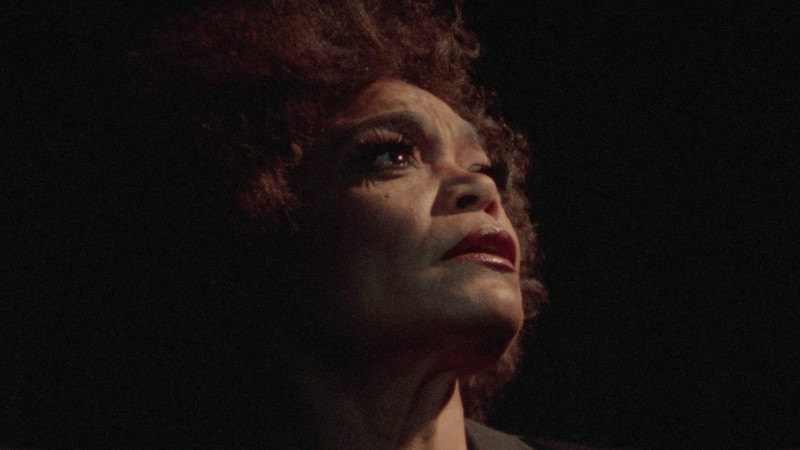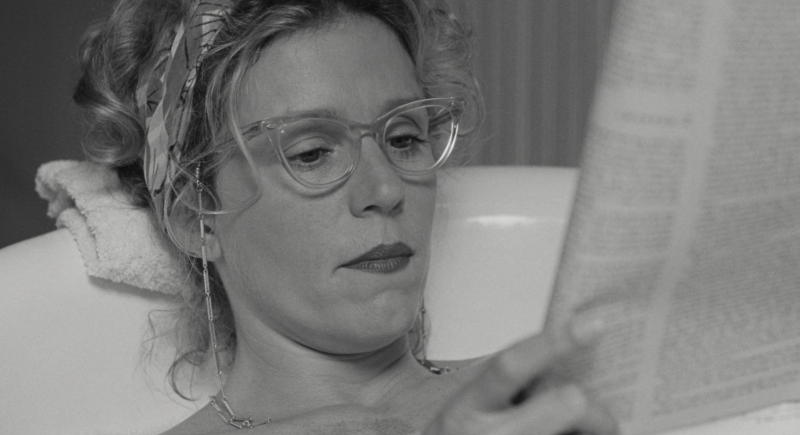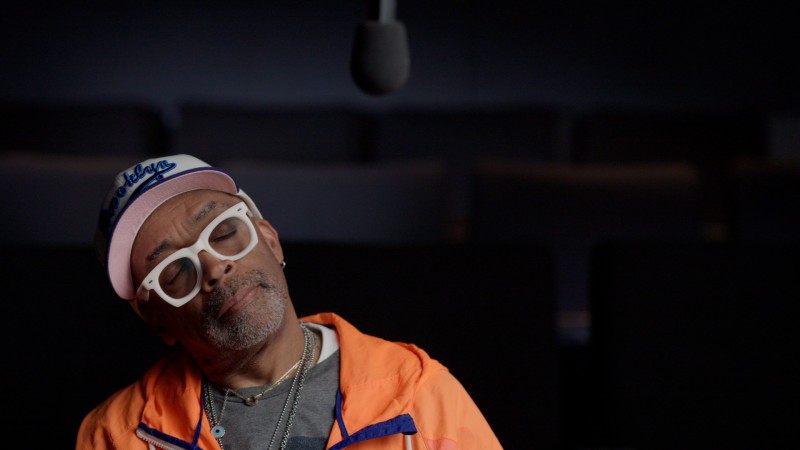Bitter Harvest

By 1971, with eleven feature films already under his belt, Rainer Werner Fassbinder was refocusing his sights. Newly possessed by the guiding spirit of Hollywood’s Austrian melodrama master Douglas Sirk, the young filmmaker was determined to demonstrate his mastery of the medium and make a radical shift toward the mainstream with The Merchant of Four Seasons. He succeeded on both fronts, in no small measure due to his rapport with his by then well-seasoned ensemble of performers. Casting The Merchant of Four Seasons largely from the stock troupe of young actors at the core of the Antiteater—the experimental political theater company he had formed out of the wreckage of Munich’s Action Theater in December 1967—Fassbinder wasn’t just availing himself of the comfort of working with close friends and longstanding colleagues. He was also, for many of his players—blossoming master character actors and future international stars among them, each capable of boiling your blood or breaking your heart—helping to solidify film careers that would go on for decades.

Winner of a German Film Award for his performance as the little-loved fruit peddler Hans Epp in The Merchant of Four Seasons, Hans Hirschmüller (born in Romania in 1940) studied theater in Munich in the early 1960s, was a founding member of the Action Theater, and remained a central figure of the Antiteater. Also a key player in several of Fassbinder’s early films, including Love Is Colder Than Death and Katzelmacher (both 1969), and in the director’s proletarian miniseries Eight Hours Are Not a Day (1972–73), Hirschmüller is today a celebrated German theater director and actor. His association with Fassbinder’s plays and scripts has continued long beyond the filmmaker’s death, with Hirschmüller directing stage versions of Ali: Fear Eats the Soul and Water Drops on Burning Rocks to much acclaim. In 1990, he won the Adolf Grimme Award for codirecting the previous year’s television documentary Yearning for Sodom, a portrait of his friend and fellow Fassbinder player Kurt Raab in his final days. In 2012, Hirschmüller directed a new stage version of Fassbinder’s Anarchy in Bavaria, one of the first plays Hirschmüller appeared in with the Antiteater, in 1969.

Exuding a gangly eroticism and an inner contempt on-screen, the precipitously leggy Irm Hermann (born Irmgard Hermann in Munich, 1948) was one of Fassinder’s steadiest colleagues and favorite players. Notoriously, the situations of the characters she plays in his films often echo the long and tumultuous—some have called it terrorizing—personal relationship she endured with the director. Previously a secretary and briefly in publishing, Hermann met Fassbinder in 1966; they became close confidants, occasional lovers, and eventual original members, along with Hanna Schygulla and others, of the Antiteater in 1967. She would ultimately appear in central roles in more than twenty of Fassbinder’s films, beginning with the short The City Tramp (1966) and concluding with Lili Marleen (1981). Hermann’s German Film Award–winning portrait of the trapped and treacherous Irmgard Epp in The Merchant of Four Seasons and her nearly silent seething through The Bitter Tears of Petra von Kant (1972) are her best-known performances internationally, but in Germany she remains a well-known and hardworking film and television actor to this day.

Radiant beyond measure, Hanna Schygulla quickly became globally emblematic of the New German Cinema of the 1970s in ways that sometimes seemed to consciously echo the trajectory of her forebear Marlene Dietrich. Crucial to Fassbinder’s cinema since her Orphan Annie–coiffed and thoroughly eroticized appearances in Love Is Colder Than Death and Katzelmacher, Schygulla, born in Chorzów, Poland, in 1943, made her film debut in Jean-Marie Straub’s short The Bridegroom, the Comedienne and the Pimp (1968). Schygulla met Fassbinder in an acting class in 1966, then joined him as an actor at the Action Theater and became a core member of the Antiteater. Their working relationship was intuitive and at times contentious, and they fell out during the making of Effi Briest (1974) and remained estranged for a number of years. Actor and director eventually reunited with a bang for the one-two punch of The Marriage of Maria Braun (1979) and Lili Marlene, enormous critical and commercial successes for the star, the filmmaker, and German cinema internationally. One of the only sympathetic figures in The Merchant of Four Seasons (as Hans’s stylish sister Anna), Schygulla went multinational with appearances in Jean-Luc Godard’s Passion (1982) and Kenneth Branagh’s Dead Again (1991). She remains at work and in demand today, with notable recent appearances in Béla Tarr’s Werckmeister Harmonies (2000), Fatih Akin’s The Edge of Heaven (2007), and Aleksandr Sokurov’s Faust (2011).

Gusti Kreissl made only a handful of films with Fassbinder, but her acting career began a decade before the filmmaker was born. Kreissl (born in Munich in 1906) made her screen debut in 1937 but didn’t begin getting regular film and television supporting parts until the 1950s. By the mid-1960s, she was a well-known face on TV mysteries and policiers. When Fassbinder cast her as the heartless Mother Epp in The Merchant of Four Seasons, Kreissl was already over sixty and a veteran of “Papas Kino” (Germany’s postwar pabulum-cinema of politics-free heimat or “home” films), which in many ways served as the filmmaker’s archenemy and antithesis. Kreissl worked with Fassbinder thrice more, in Eight Hours Are Not a Day, Ali: Fear Eats the Soul (1974),and The Stationmaster’s Wife (1977), and continued working steadily in television until her death in Munich in 1986.

The handsome and friendly face of Klaus Löwitsch as Hans’s “best friend” Harry Radek in The Merchant of Four Seasons is one of the film’s most startling effects: suddenly, in the midst of sad sacks and sourpusses, a bona fide movie star smile. Born in Berlin in 1936, the son of an Austrian engineer and a German ballerina, Löwitsch enjoyed a career that was varied and border-crossing. He trained in classical dance at the University of Music and Performing Arts in Vienna before focusing on acting; his film career began in 1956. During the sixties, he became a familiar television face and as a singer had a couple of minor hits. Löwitsch appeared in Otto Preminger’s Rosebud (1975), Sam Peckinpah’s Cross of Iron (1977), and Clint Eastwood’s Firefox (1982), and in 1979 worked for both Fassbinder (in The Marriage of Maria Braun) and the John Ford protégé Andrew McLaglen, in the Richard Burton–Robert Mitchum war pic Breakthrough—an antinomy Fassbinder, if not Ford, would surely have appreciated. Fassbinder cast the actor in a pair of leading roles, as Fred Stiller, the reality-challenged, headache-suffering hero of World on a Wire (1973), and as Maria Braun’s husband, Hermann. European audiences knew him best as the private eye Peter Strohm in the like-named TV show (1989-96). Löwitsch died in Munich in 2002.

Beginning with his title role in Fassbinder’s The American Soldier (1970) as a German-American Vietnam vet turned killer for hire, the ruggedly built and bruisingly handsome Karl Scheydt (born 1940) became a familiar face in the director’s retinue for the next decade. He appears in fifteen of Fassbinder’s films, often as heavies, and thus, naturally, as the producer in the filmmaking roman à clef Beware of a Holy Whore (1970). As Anzell in The Merchant of Four Seasons, Scheydt plays one of Fassbinder’s typically complex minor roles: part trolling john (who becomes Hermann’s character’s first trick), part satisfying lover, part swindler, part chump. A versatile crew member on many sets, Scheydt worked behind the scenes, usually uncredited, as assistant director, production manager, sound engineer, and decorator. His final film for Fassbinder was the director’s last, Querelle (1982). The actor continued appearing sporadically on TV and in films until the early nineties, then faded from the screen. He died in 2009.

Muse, chanteuse, and—from 1970 to ’72, a crucial period in the filmmaker’s formation—Mrs. Fassbinder, Ingrid Caven is one of cinema’s most extraordinary creatures: fragile, indestructible, smoldering, outspoken, enchanting, remote. Born Ingrid Schmidt in Saarbrücken, Germany, in 1938, Caven was discovered by Fassbinder and composer Peer Raben in a theater lobby in 1967. Her stunning turn as “the merchant’s great love” in The Merchant of Four Seasons was one of twenty-some roles she would take on for Fassbinder, concluding with In a Year with 13 Moons in 1978. Caven appeared in films and on television steadily throughout the 1980s, but her career as a cabaret singer then began to take precedence. Her post-Fassbinder screen appearances have run to the inner and outer reaches of European art cinema: Werner Schroeter’s Day of the Idiots (1981), André Téchiné’s My Favorite Season (1993), Raoul Ruiz’s Marcel Proust’s “Time Regained” (1999), Claire Denis’s 35 Shots of Rum (2008). The subject of a prizewinning and best-selling 2004 work of fiction, Ingrid Caven: A Novel, written by her partner, Jean-Jacques Schuhl, and a 2014 film portrait by Bertrand Bonello, Ingrid Caven: Music and Voice, Caven is a kind of post-diva, part Piaf, part Dietrich, and perhaps secretly part Carol Burnett. She’s been known to come crashing onstage in a faux pratfall into a music stand, but it’s the audience that’s thrown off-balance, not Caven, a deft comedian despite her sometimes stern demeanor and custom-designed Yves Saint Laurent black velvet dress.

One of the most versatile members of Fassbinder’s stock company, Kurt Raab worked on more than thirty of the director’s films, on and behind the screen. Born in Bergreichenstein, Sudetenland (now part of the Czech Republic), in 1941, Raab was a high school classmate of Raben’s who’d appeared on German television in Raben’s staging of Antigone in 1967. His first film was Fassbinder’s Love Is Colder Than Death; a year later, in 1970, he was the lead in Why Does Herr R. Run Amok?. Playing Hans’s heartless brother-in-law, Kurt, in The Merchant of Four Seasons, Raab remained a close friend and collaborator of the director—who nicknamed him Emma Potato—through The Stationmaster’s Wife, in which Raab again played the lead role. A playwright as well as an actor, Raab was also credited as assistant director on several of Fassbinder’s films, and he worked extensively as a set decorator for a variety of filmmakers; his sets for Fassbinder’s Whity (1971) won him a German Film Award. Raab’s tragic death in 1988 from AIDS-related complications played out publicly and painfully in Germany, where understanding of the illness was poor at best: the actor worked until he died in films designed to raise awareness of the disease, even as he was practically quarantined in the Hamburg Tropical Institute. He was finally refused burial in Steinbeißen, the Bavarian town where his family had settled in 1945, and was buried in Hamburg instead. His last days were recorded for Yearning for Sodom, which he codirected with Hanno Baethe and his former Fassbinder colleague Hirschmüller, and for which Raab was posthumously awarded the Adolf Grimme Award, along with his codirectors.

Rivaled only by Catherine Scorsese as cinema’s greatest director’s mother, Lilo Pempeit was born Liselotte Irmgard Pempeit in Gdańsk, Poland, in 1922; she divorced Helmuth Fassbinder, a doctor, in 1951. The couple had one child, Rainer Werner, in 1945. She had a successful career as a translator of English-language and French literature that began with a collection of Truman Capote’s short stories in 1957, and married journalist Wolf Eder in 1959. She began working for Munich’s Society for Radiation Research in 1969 and remained there into the 1980s. In her spare time, she helped her son in his burgeoning career as a theater and film impresario, performing bookkeeping and managerial duties and acting in his films. She appeared first in the short The Little Chaos in 1966, and finally in Veronika Voss in 1982. She turns up, as she often did, along the margins of things in The Merchant of Four Seasons, as one of the Epps’ customers. Pempeit’s acting career ended with her son’s filmmaking career. She died in Munich in 1992.

Walter Sedlmayr had a storied career as an actor, appearing in dozens of films and dozens of dozens of television episodes, usually as a sort of Bavarian man’s man. His death was storied too, so tawdry and seemingly at odds with the actor’s persona that it was turned into a movie all its own. Born in Munich in 1926, Sedlmayr began making films in 1949 and worked steadily in film and television for almost forty years. He was familiar to German TV audiences by the time he began working with Fassbinder, on 1970’s The Niklashausen Journey, itself one of the many films the director made for German television during the period. But Sedlmayr’s arrest in 1971—the same year he appeared as a bargaining fruit cart salesman in The Merchant of Four Seasons—for possession of a stolen religious carving, the Blutenburger Madonna, immediately raised his public profile. He was acquitted of all charges but capitalized on the publicity surrounding his trial to boost his acting career. Sedlmayr worked often with Fassbinder through the 1970s, mainly as a character actor in small parts, appearing in World on a Wire, Fox and His Friends (1975), and, perhaps most notably, as the two-faced shopkeeper in Ali: Fear Eats the Soul. In 1990, Sedlmayr was found beaten and stabbed to death in the bedroom of his Munich apartment. Early suspicions pointed toward a possible male prostitute and the secrets of the actor’s private life, but eventually his former business partners were found guilty of the crime. Sedlmayr’s life and the mystery surrounding his murder became the subject of German filmmaker Jo Baier’s television biopic Wambo in 2001.

Famous in the Fassbinder canon, and in the history of cinema, as the star of the 1974 masterpiece Ali: Fear Eats the Soul, El Hedi ben Salem burned briefly but just as brightly as any of the director’s greatest icons. Born to a Berber family in Morocco circa 1935, Salem married when he was fifteen and eventually fathered five children. He left for Europe in 1970 and met Fassbinder in a Paris bathhouse in 1971. The attraction was mutual and immediate, and Salem moved to Germany to live with the director. The Merchant of Four Seasons was his first film; in it, he plays “the Arab,” who tortures and nearly executes Hans during his stint in the foreign legion. Salem’s relationship with Fassbinder was legendarily violent, fueled by booze and bullying. Ali: Fear Eats the Soul was Salem’s debut as a leading man and the beginning of the end of his career. Fassbinder had written the lead role in his reinvention of Douglas Sirk’s All That Heaven Allows especially for Salem, as a way of saying good-bye. Salem did not take the breakup well, going on a drunken rampage that ended with three stabbings, a scramble across the border into France, and Salem’s suicide in a French prison cell in 1977. Fassbinder dedicated his final film, Querelle, to his former lover and star.

A widely experienced and altogether unusual filmmaker in his own right, Hark Bohm appeared in bit and supporting parts in numerous Fassbinder films throughout the 1970s, his characters’ pursed faces often bearing evidence of the constipated souls within. Born in Hamburg in 1939, Bohm appears for only a moment in The Merchant of Four Seasons, as the fellow policeman who interrupts one of Hans’s few moments of bliss (a blow job from a just-busted streetwalker) with his literally withering gaze. Bohm’s credits as an actor in German indie and mainstream cinema are extensive; his rarely-seen-abroad films as a director sound interesting, not to say potentially disturbing, as many of them feature his numerous (and publicly scrutinized) adopted and foster children in starring roles. In 1979, Bohm cofounded the Filmfest Hamburg with Werner Herzog, Volker Schlöndorff, and Wim Wenders; in 1993, while a professor at the University of Hamburg, he inaugurated the school’s film studies program. Bohm, now seventy-five, still occasionally appears in films.

As an actor in his own films, Rainer Werner Fassbinder (born Bad Wörishofen, Germany, 1945, died Munich, 1982)treated himself little differently than he did his greatest stars. Only once taking a leading role, in the extraordinary Fox and His Friends, he’d occasionally cast himself in significant supporting parts, like the surly and reactionary son in Ali: Fear Eats the Soul, who gazes at Salem with both conservative contempt and a veteran cruiser’s longing. Usually, though, Fassbinder kept himself at the edges of his films’ action, in Hitchcockian cameos or brief but accentuated bits, as he does in The Merchant of Four Seasons, as the loutish Zucker, a momentarily encountered acquaintance of Hans’s who serves mainly to set up the hyperbolic introduction of Löwitsch’s character a couple of seconds later in the scene. The greatest filmmaker who ever lived, Fassbinder knew when to stake his claim with a standout moment and when to simply lie back in the cut.




